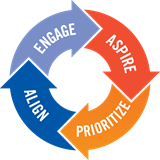What We Do
Our aim is to transform schools into a place where students, families, staff, and the surrounding community can work together to ensure every student is successful.
Each Community School may use different strategies and activities to improve its school and community, but each share these guiding practices:
Shared Leadership: To transform how schools make decisions by engaging diverse stakeholders to participate in the development and ownership of local strategies.
- Community School Leadership Team - This diverse team identifies local strategies and makes decisions for how to best ensure student and school success.
- Family Leadership Organization - Community Schools work to build family leadership by creating safe, welcoming spaces for local organizing and practicing family-centered engagement strategies.
- Youth Council - Community Schools work to build youth leadership by creating safe, welcoming spaces for local organizing and practicing student-centered engagement strategies.
- Collaborative Staff: There are systems in place to ensure ongoing communication and encourage intentional collaboration between school staff.
Equity: To transform how schools collect and use data; organize and manage partnerships and resources to ensure students, families, and staff have the resources they need to be successful.
- Community Engaged Assessment - Each school conducts a community-engaged assessment process that identifies local priorities and uses student centered data to inform goals and strategies.
- Developing school vision and setting school-based priorities - Each school develops a shared vision that focuses on local priorities and supports the whole child. This vision is communicated to all stakeholders and has ongoing systems of accountability.
Cultural Relevance: To transform how schools relate and interact with their students, families and community in a more culturally relevant and restorative way leading to positive school cultures, strong relational trust, and high quality teaching.
- Culturally Responsive Practices - Schools receive support to implement strategies that build on the assets of the entire community, acknowledge personal and institutional biases, and respond to the self-identities of students, families, school staff and community members.
- Restorative Practices - Schools receive support to implement Restorative Practices and other positive behavior strategies that work to build proactive, positive relationships and repair any harm that may have occurred in order to restore relationships with dignity and care.
How It Works

The Community Schools strategy
Engage: A full-time Community School Coordinator increases capacity of the school to engage multiple stakeholders including community partners, families, staff, students, and neighborhood residents.
Aspire: Schools collectively identify school and community aspirations and barriers to success by collecting diverse knowledge through Community Conversations, combine with additional school & community data.
Prioritize: A site-based Community School Leadership Team analyzes data, develops a shared vision, key priorities and strategic plan through local-decision making.
Align: Community partnerships, initiatives, and policies are developed and/or aligned to support a shared vision and key priorities reflected in the School Improvement Plan to ensure collaboration and collective action.
Current Community Schools
In partnership with Milwaukee Public Schools, United Way is currently working with sixteen MCSP Schools and ten partner organizations to employ a Community School Coordinator at each school: